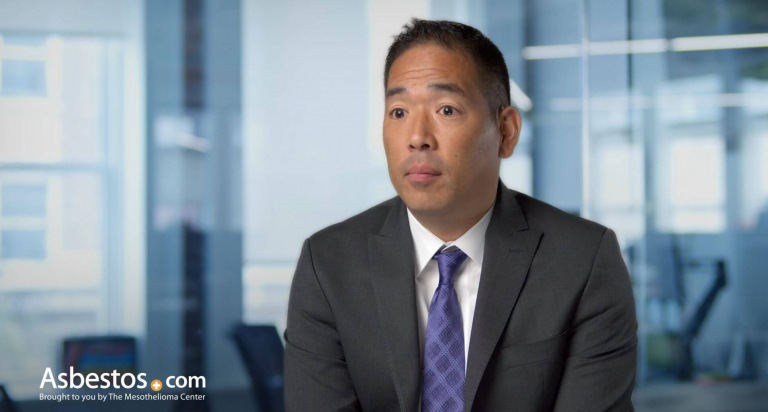
Connect with top-rated doctors specializing in mesothelioma treatment, who will personalize treatment options based on your diagnosis.
Find Your SpecialistDoctors treat mesothelioma with surgery, chemotherapy, radiation and immunotherapy to reduce or remove tumors and improve quality of life. Newer treatment options such as targeted therapy, clinical trials and multimodal treatment are tailored to stage, type and overall health.

Expert Take
Dr. Jeffrey Velotta: What do you feel is the best approach to treating mesothelioma
"Most helpful, steered us in the right direction for treatmen..." see more
Elaine C. - Mesothelioma Patient
"Because of their guidance, I was able to navigate getting my..." see more
Deanna B. - Daughter of a Mesothelioma Patient
"Hearing the news about my mother's diagnosis was heartbreaki..." see more
Danielle W. - Daughter of a Mesothelioma Patient
"My son Carlos was diagnosed with this terrible and unknown d..." see more
Martha M. - Mother of a Mesothelioma Patient
"Extremely communicative and helped my dad get an appointment..." see more
Sunni H. - Loved One of a Mesothelioma Patient
"Danielle DiPietro was an invaluable resource for me. Her sug..." see more
Deborah C. - Spouse of a Mesothelioma Patient
"I was very grateful and appreciative of Dr. Smart from The M..." see more
Kimberlin C. - Spouse of a Mesothelioma Patient
"In January of 2016, my husband was diagnosed with peritoneal..." see more
Gloria R. - Spouse of a Mesothelioma Patient

Expert Take
Dr. Jeffrey Velotta: What do you feel is the best approach to treating mesothelioma
At a Glance
View Best Treatment Options for Your Diagnosis
We’ve carefully reviewed leading medical research and incorporated insights from specialists and real patient experiences to show the treatments with the most promising results for each type of mesothelioma. This information is not professional medical advice. It’s intended to provide clear, research-based guidance to open the conversation with your health care team.
Not Sure Which Type?
Learn About Mesothelioma TypesTreatment for pleural mesothelioma, which affects the lining of the lungs and is the most common type of this cancer, typically involves systemic or whole-body therapies. This includes chemo and immunotherapy, often combined with surgery and radiation for patients who qualify. Most specialists recommend combining approaches, known as multimodal treatment, to attack the cancer from multiple angles for the best outcomes.
We’ve ranked the order of these pleural mesothelioma treatments based on what’s best for most people diagnosed with this type of cancer. As an example, specialists say chemotherapy, followed by or combined with immunotherapy, is likely the first and second treatments they consider for people diagnosed with peritoneal mesothelioma.
Chemotherapy
Best for
What is chemotherapy?
Standard medicines
Key stats
What doctors say
“Even if you have surgery, you usually need additional treatment such as chemotherapy… For patients who cannot have surgery, systemic treatment is still important to control the cancer.”

Dr. Hedy Lee Kindler, Associate Vice Chair for Clinical Research at University of Chicago Medicine
What survivors say
“I had a lot of life left to live. I was tired from the chemo, but I wanted to give it one more try. I’d encourage others to do the same.”

Barbara Lapalla, Pleural Mesothelioma Survivor
Immunotherapy
Best for
What is immunotherapy?
Standard medicines
Key stats
What doctors say
“I have personally witnessed the significant impact immunotherapy has had on improving survival for some patients with certain types of mesothelioma.”

Dr. Andrea Wolf, Director of the New York Mesothelioma Program at Mount Sinai
What survivors say
“I tell people today, I’m a walking miracle. They don’t believe in miracles. Then they see me.”

Barbara Lapalla, Pleural Mesothelioma Survivor who receives Keytruda 3 times per week
Radiation Therapy
Best for
What is radiation therapy?
Most common types
Key stats
What doctors say
“So when you do mesothelioma surgery… the issue of localized recurrence can occur. And so those patients, we do recommend they undergo either radiation or additional surgical intervention.”

Dr. Jeffrey Velotta, Thoracic surgeon at Kaiser Permanente Oakland Medical Center
What Survivors Say
“Radiation for pleural mesothelioma isn’t fun, but it’s manageable. It took us fully a year to get my SAbR/PULSAR radiation treatment at UT Southwestern in Dallas approved… and I doubt that I would be here without it.”

Michael Cole, Pleural Mesothelioma Survivor
Surgery
Best for
What is surgery?
Most common types
Key stats
What doctors say
“I feel surgery first, followed by systemic therapy (e.g. chemotherapy, immunotherapy or both) is the best multimodality approach for mesothelioma.”

Dr. Jeffrey Velotta, Thoracic surgeon at Kaiser Permanente Oakland Medical Center
What survivors say
“I believe that the aggressive treatment I had in the beginning was absolutely necessary to give me a chance to be here now, and I am grateful for the decision that we made.”

Michael Cole, Pleural Mesothelioma Survivor
These are the top pleural mesothelioma treatment approaches because they consistently deliver the strongest survival outcomes and quality-of-life improvements across different stages of pleural mesothelioma. Most patients receive a combination of these treatments rather than a single approach, with individual plans customized depending on cancer stage, overall health and personal treatment goals.
How These Treatments Help Pleural Patients
The National Cancer Database shows the greatest survival rates among pleural mesothelioma patients who received surgery and chemo. When combined strategically, these treatments attack cancer from multiple angles and give doctors flexibility to adjust plans as needs change throughout the treatment journey.

Connect with top-rated doctors specializing in mesothelioma treatment, who will personalize treatment options based on your diagnosis.
Find Your SpecialistPleural mesothelioma survivors, doctors and other experts explain how these treatments have improved their quality of life and extended their life expectancies. Watch as they share their inspirational stories.
Consider these insights when consulting with your doctor. They may help you determine the best treatment for your pleural mesothelioma.
Undergoing Mesothelioma Surgery
The first treatment for the mesothelioma was a pleurectomy decortication, which is an operation. They cut through the middle of your back, between your ribs to the almost the middle of your front. It was supposed to be a eight inch incision, but it looks more like twelve. It, they had to remove a rib. They took the cancer that was collected around my the plural, lining of my lung and it was scraped off. I had six lymph nodes cut off. Two of them turned out also positive for mesothelioma. So I was pretty close to the stage where I was still a candidate to have the operation done, because it hadn’t, spread further.
Sharing My Mesothelioma Surgery Experience
I knew that I would be in the hospital for, you know, at the very least a week. And that I was going to have radiation for five weeks after that. Doctor Cameron said you will probably be in pain for, like, a year. And he said, well, Kim, some patients, when they bend over, they get short of breath. Because I’m probably going to rearrange reconstruct your diaphragm. And so you might have that. You may have coughing. You may have increased flem and secretions. You may have shortness of breath, but you will be able to go back to work. And I said, really. And I said, okay. That sounds great to me. Jeanette came came with me. She stayed in the hospital, and my friend Stacy came. And my husband, Richard, they allowed the three to stay in the hospital room with me. My surgery ended up being about eight hours. I woke up. I remember going in, and I was nervous. You know, I thought, well, what if I don’t wake up? Prior to the surgery, had my will taken care of, my trust. I I kind of wrapped up those kind of legal issues. And, When I woke up, I remember thinking, I made it. I made it. I, you know, I knew that as a nurse, that there was a possibility that I I could maybe not make it through surgery, but I remember saying to my cousin who was there. It was the first face that I call. And I said, oh my gosh, Elaine, you’re here. I I made it. And really, after that, I thought, well, I don’t wanna say I was home free, but I thought, okay. Oh, you’re gonna be fine, Kim.
What Is Immunotherapy?
[MUSIC PLAYING] So immunotherapy is a new technique that
has been looked at in terms of, it boosts their own immune cells. So the idea is you target a specific protein in the immune system and that will actually enhance the immune cells in your body to go ahead and attack the mesothelioma or cancer cells, specifically. So we normally have normal immune cells that are normally protecting us from infection or for other things, but this, just based on certain pathways that we know are active in cancer, then you boost that activity so that the immune cells will actively try to attack and engulf or eat, as you will, the cancer cells.
And so that's really where immunotherapy is going to be beneficial because it's thought to be a, quote unquote, "more natural way," and not necessarily like chemotherapy, where you're actually giving a toxic substance that will kill and attack and does not have a preference for mesothelioma cells. It has a preference for all cells. And so I think that's where immunotherapy is going to be a nice addition.
In 2025, The Mesothelioma Center surveyed doctors and nurses about their recommendations for pleural mesothelioma treatment approaches. The chart shows that respondents favored chemotherapy plus immunotherapy, which aligns with our ranking of the best treatments.
| Treatment Approach | % of Respondents |
|---|---|
| Chemotherapy + Immunotherapy | 39% |
| Surgery (P/D or extrapleural pneumonectomy) | 18% |
| Multimodal (combination of surgery, chemo, immunotherapy, radiation) | 17% |
| Chemotherapy (e.g., pemetrexed + cisplatin/carboplatin) | 16% |
| Palliative/supportive care | 10% |
For eligible peritoneal mesothelioma patients, cytoreductive surgery combined with heated chemo is often the cornerstone of care for this rare cancer that affects the lining of the abdomen. A higher percentage of people qualify for surgery compared to pleural patients. When combined with HIPEC, this approach has produced the longest survival times for peritoneal mesothelioma.
We’ve ranked the order of these peritoneal mesothelioma treatments based on what’s best for most people diagnosed with this type of cancer. For example, specialists agree that cytoreductive surgery combined with HIPEC is likely the first treatment they consider for people diagnosed with peritoneal mesothelioma.
Cytoreductive Surgery + HIPEC
Best for
What is CRS+HIPEC?
Standard approach
Key Stats
What Doctors Say
“I tell my peritoneal mesothelioma patients, with the good treatment we use now, the median survival can increase years versus the survival rate without treatment.”

Dr. Charles Conway, Director of surgical oncology at the Ridley-Tree Cancer Center
What Survivors Say
“Just as with any surgery, HIPEC has its risks and side effects. Several studies have shown that HIPEC surgery drastically improves life expectancy in about half of the peritoneal mesothelioma patients who have it. As for me, the benefits outweighed the risks!”

Tamron Little, Peritoneal mesothelioma survivor diagnosed in 2007
Chemotherapy
Best for
What is surgery for peritoneal mesothelioma?
Standard medicines
Key stats
What doctors say
“For patients who cannot have surgery, systemic treatment is still important to control the cancer.”

Dr. Hedy Lee Kindler, Associate vice chair for clinical research at University of Chicago Medicine
What survivors say
“I was given a new chemo cocktail every 21 days for three months. In 2012, I was officially in remission! In disbelief, the doctor performed an exploratory scope, and again, everything was clear. I’ve been in remission ever since.”

Kasie Coleman, Peritoneal survivor diagnosed in 2010
Immunotherapy
Best for
What is immunotherapy for peritoneal mesothelioma?
Emerging approaches
Key stats
What doctors say
“The combination of [Opdivo] and [cytoreductive surgery] resulted in a long-term survival in this patient with sarcomatoid-predominant peritoneal mesothelioma.”

Dr. Paul Sugarbaker, President of the Foundation for Applied Research in Gastrointestinal Oncology, in a recently published case study
What survivors say
“I can only receive the immunotherapy for 2 years. It will not cure mesothelioma. It will slow it down or put it in a form of remission.”

Tami Pream, Peritoneal mesothelioma survivor diagnosed in 2021
Peritoneal mesothelioma requires a different treatment strategy than pleural mesothelioma, with surgery playing a more central role. Cytoreductive surgery with HIPEC has become the gold standard because it directly targets cancer in the abdominal cavity where it develops, achieving 5-year survival rates that far exceed other approaches.
How These Treatments Help Peritoneal Patients
Higher percentages of peritoneal patients qualify for surgery compared to pleural patients because the cancer is usually contained within the abdominal cavity. When patients can undergo cytoreductive surgery with HIPEC, this approach has consistently produced the best long-term outcomes for peritoneal mesothelioma.

Discover financial assistance programs, insurance guidance, and veteran benefits to help cover your mesothelioma treatment expenses.
Explore Your OptionsPeritoneal mesothelioma survivors, physicians and medical specialists describe how current treatment options have enhanced patients’ quality of life and contributed to longer life expectancies. Watch as they share their experiences and inspiring stories.
Keep these insights in mind when meeting with your peritoneal mesothelioma specialist. They can help guide your conversation, clarify your options and support you in choosing the most appropriate treatment plan for your peritoneal mesothelioma.
Most mesothelioma patients receive multimodal treatment, with specific combinations depending on cancer type, stage and overall health. Multimodal therapy combines treatment types to attack mesothelioma from multiple angles. Research shows combining treatments often achieves better outcomes than single-treatment approaches, with the National Cancer Database showing the greatest survival rates among patients who received surgery and chemotherapy.
Common Multimodal Approaches by Type
The key advantage of multimodal therapy is flexibility. Doctors can adjust treatment plans as your cancer responds and your needs change throughout the treatment journey, combining therapies strategically to maximize effectiveness while managing side effects.

Tammy Frank
25-Year Peritoneal Mesothelioma Survivor Discusses Her Recovery
Tammy was diagnosed with peritoneal mesothelioma in 1999. She shares that as part of her multimodal treatment plan, she also underwent chemotherapy and radiation.
Tammy Frank
Palliative care focuses on relieving symptoms and improving the quality of life for mesothelioma patients at any stage. Research shows palliative care can improve quality and length of life when integrated throughout a patient’s treatment journey, not just at the end of life. Palliative procedures and supportive treatments work with curative therapies to manage pain, breathing difficulties and other symptoms.
Common Palliative Approaches by Mesothelioma Type
Treatments like chemo or radiation can be palliative, improving patient comfort as tumors shrink, pain is reduced and breathing improves. “I don’t think anyone should have to suffer when they don’t have to,” notes Amy Pelegrin, director of hospice care at The Mesothelioma Center. “Your care team can coordinate palliative treatments with your curative therapies to keep you as comfortable and active as possible.”
Clinical trials are advancing the next generation of mesothelioma treatments. Researchers are testing promising approaches like cancer vaccines that train the immune system to attack tumors, gene therapies that alter cancer cells to stop their growth and specialized viruses that infect and destroy cancer cells while sparing healthy tissue. Many of these emerging treatment options are only accessible through mesothelioma clinical trials, offering patients early access to potentially life-extending treatments.
Several studies focus on combination treatments that build on today’s gold standard therapies to achieve even better results. For example, Ofev, a medication approved for pulmonary fibrosis, is now in phase III trials for pleural mesothelioma. Other trials are exploring a future of treatments combining immunotherapy.
Joining a clinical trial can give you additional treatment options, especially if standard therapies haven’t worked or you’re looking for more aggressive approaches. Your mesothelioma doctor can help determine if a trial may be right for you.

Access mesothelioma clinical trials matched to your diagnosis. Get help with eligibility and enrollment.
Get StartedYour treatment plan will be customized for your personal health and goals. Finding the right specialist for your specific case is critical. A Patient Advocate personally connects you with mesothelioma experts matched to your diagnosis, navigates insurance coverage, secures financial resources to cover treatment costs and provides information about clinical trials. Your Patient Advocate will guide you from diagnosis through treatment, ensuring you and your loved ones have the support and information needed to make confident decisions about your care.
Bring these questions to your next appointment to help guide treatment decisions and feel more informed about your care. Your answers will help you understand your specific situation and what treatment options make the most sense for you.
Getting clear answers to these questions helps you make confident decisions about your care. Consider bringing a family member or friend to appointments to help remember the information discussed and ask follow-up questions.
We identified the best mesothelioma treatments through a multilayered research approach combining firsthand insights with established clinical evidence. Our evaluation considers real-world treatment patterns, specialist recommendations and published outcome data to provide the most accurate picture of current mesothelioma care.
This comprehensive approach ensures our recommendations reflect both the practical expertise of specialists actively treating mesothelioma and the strongest available clinical evidence. We regularly update this page as new research and survey data become available.
Stay up-to-date on treatment, research, clinical trials, doctors and survivors
The information on this website is proprietary and protected. It is not a substitute for professional medical advice, diagnosis or treatment. Any unauthorized or illegal use, copying or dissemination will be prosecuted. Please read our privacy policy and terms of service for more information about our website.
This website and its content may be deemed attorney advertising. Prior results do not predict a similar outcome.
The Mesothelioma Center’s claim as the most trusted resource is based on our more than 150 5-star Google and BBB reviews. Our organization also helps more than half of all mesothelioma patients annually diagnosed.
Your web browser is no longer supported by Microsoft. Update your browser for more security, speed and compatibility.
If you are looking for mesothelioma support, please contact our Patient Advocates at (855) 404-4592
Asbestos.com. (2026, February 26). Mesothelioma Treatment. Retrieved March 5, 2026, from https://www.asbestos.com/treatment/
"Mesothelioma Treatment." Asbestos.com, 26 Feb 2026, https://www.asbestos.com/treatment/.
Asbestos.com. "Mesothelioma Treatment." Last modified February 26, 2026. https://www.asbestos.com/treatment/.
The Mesothelioma Center at Asbestos.com has provided patients and their loved ones the most updated and reliable information on mesothelioma and asbestos exposure since 2006.
Our team of Patient Advocates includes a medical doctor, a registered nurse, health services administrators, veterans, VA-accredited Claims Agents, an oncology patient navigator and hospice care expert. Their combined expertise means we help any mesothelioma patient or loved one through every step of their cancer journey.
More than 30 contributors, including mesothelioma doctors, survivors, health care professionals and other experts, have peer-reviewed our website and written unique research-driven articles to ensure you get the highest-quality medical and health information.
My family has only the highest compliment for the assistance and support that we received from The Mesothelioma Center. This is a staff of compassionate and knowledgeable individuals who respect what your family is experiencing and who go the extra mile to make an unfortunate diagnosis less stressful. Information and assistance were provided by The Mesothelioma Center at no cost to our family.
Lashawn , Mesothelioma patient’s daughter


We Thoroughly vet individuals who are experts in their field to contribute to articles on Asbestos.com. We believe in the integrity and quality of our educational materials, and only publish information that is relevant, factual, and backed by experts.


Dr. Velotta is a leading thoracic surgeon and pleural mesothelioma specialist at Kaiser Permanente Oakland Medical Center and a Clinical Assistant Surgical Professor at the University of California, San Francisco School of Medicine. With more than 15 years of experience, he leads research efforts in minimally invasive lung cancer surgery, pain management post-thoracic surgery and multimodal mesothelioma treatment. He is recognized for advancing image-guided surgical techniques and improving regional access to specialized mesothelioma care.
Our fact-checking process begins with a thorough review of all sources to ensure they are high quality. Then we cross-check the facts with original medical or scientific reports published by those sources, or we validate the facts with reputable news organizations, medical and scientific experts and other health experts. Each page includes all sources for full transparency.
Please read our editorial guidelines to learn more about our content creation and review process.
